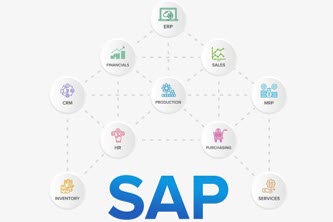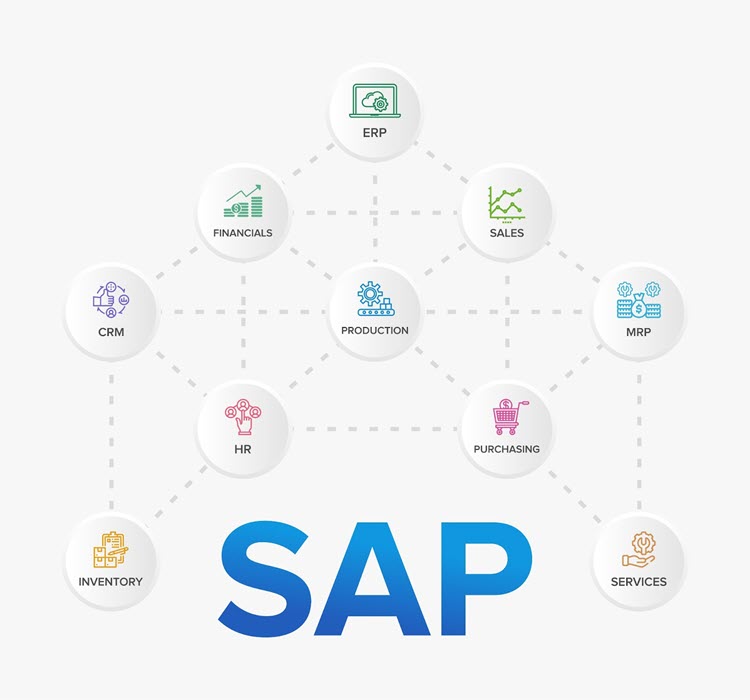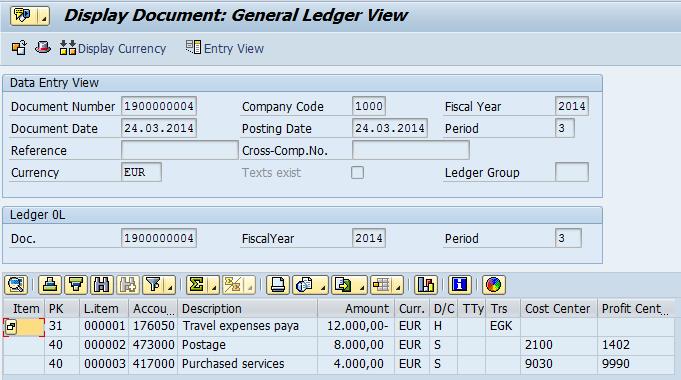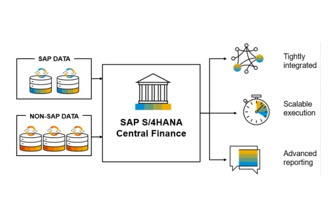Top 5 SAP Modules In 2024
by Michael Management

In the ever-evolving business technology landscape, staying ahead of the curve is essential for sustained success. SAP, the world's leading enterprise software provider, continually adapts to meet changing business needs. As we approach 2024, it's important to understand the SAP modules projected to affect business operations significantly. This article provides a comprehensive overview of several SAP modules that will drive business excellence in the coming year, offering you the insights you need to make informed decisions for your career and organization.
Understanding SAP Modules
SAP modules are specialized components within the SAP software ecosystem, each designed to address specific business functions and processes. These modules provide organizations with comprehensive solutions to streamline operations, optimize workflows, and facilitate data integration. By selecting and implementing relevant SAP modules, businesses can tailor their SAP environments to meet their unique needs, fostering efficiency and agility across various aspects of their operations.
Three Factors Driving SAP Module Trends in 2024
The business world is constantly evolving, and so is SAP. Several factors are driving the trends in SAP modules for 2024:
- Digital Transformation and Innovation:
As businesses undergo digital transformation, there is a growing demand for SAP modules that support innovative technologies. Emerging trends such as artificial intelligence (AI), machine learning (ML), Internet of Things (IoT), and robotic process automation (RPA) are influencing the development and adoption of SAP modules. Companies seek modules that can harness these technologies to improve efficiency, automate processes, and gain actionable insights from their data.
- Industry-Specific Requirements:
Different industries have unique operational needs and compliance standards. SAP modules evolve to address industry-specific requirements, ensuring organizations can tailor their SAP implementations to align with their sector's regulations and best practices. For example, modules may be customized for healthcare, retail, manufacturing, or financial services, providing specialized functionalities that meet the distinct challenges of each industry.
- Migration from SAP ECC 6.0 to SAP S/4 HANA:
This may be the biggest reason of them all. In 2027, SAP will end its support for SAP Business Suite 7, which includes SAP ECC 6. Teams have spent years developing ECC skills and customizing their systems to perfectly fit their business needs, but the modules in S/4 Hana are subtly different. Those who learn the ropes of S/4 early, before companies have started their migrations, position themselves to reap future benefits in both employability and compensation.
Key SAP Modules for 2024
In the following section, we'll take a closer look at several of the leading SAP modules that will maintain their prominence in 2024. These functional modules hold critical roles in supporting core business processes and contributing to an organization's overall efficiency and effectiveness.

#1 SAP Sales and Distribution (SD)
The SD module manages the entire sales and distribution process, from order creation to delivery and billing. It enables organizations to streamline their sales operations, track customer interactions, manage pricing and discounts, and ensure timely order fulfillment. Integration with other SAP modules like Material Management (MM) and Finance (FI) provides a comprehensive view of the entire order-to-cash process.
Advantages
- Comprehensive Order-to-Cash Process:
The SD module provides end-to-end support for the order-to-cash process. It starts with order creation and encompasses subsequent delivery, shipping, and billing stages. This comprehensive coverage ensures that all aspects of the sales cycle are seamlessly integrated. Organizations can improve visibility into their operations by having a unified system for managing sales processes, reducing manual errors, and enhancing overall order fulfillment efficiency.
- Customer Relationship Management (CRM) Integration:
One of the significant advantages of the SD module is its integration with SAP's Customer Relationship Management (CRM) functionalities. This integration lets organizations maintain a 360-degree view of customer interactions, preferences, and history. By consolidating customer data within the SAP environment, businesses can make informed decisions, personalize their sales approaches, and build stronger, long-term customer relationships. This integration enhances the overall customer experience and supports targeted marketing and sales efforts.
#2 SAP Material Management (MM)
Material Management focuses on procurement and inventory management. It helps organizations optimize their supply chain processes by managing procurement, vendor relationships, and inventory control. The MM module ensures that materials are available when needed, reduces procurement costs, and facilitates efficient inventory handling. Integration with other modules, such as SD and Production Planning (PP), ensures a seamless flow of information across the organization.
Advantages
- Optimized Procurement Processes:
The MM module streamlines and optimizes the procurement process, allowing organizations to manage their purchasing activities efficiently. It includes functionalities such as vendor evaluation, purchase requisition creation, purchase order processing, and goods receipt. By providing a centralized platform for procurement activities, the MM module helps organizations make informed decisions, negotiate better terms with suppliers, and ensure timely availability of materials. This optimization leads to cost savings, reduced procurement cycle times, and improved overall procurement efficiency. - Effective Inventory Management:
Inventory management is a critical aspect of the MM module, enabling organizations to maintain optimal stock levels and minimize carrying costs. The module supports real-time visibility into inventory levels, tracks goods movements, and facilitates inventory valuation. By having accurate and up-to-date information on inventory, organizations can avoid stockouts, reduce excess inventory, and improve demand forecasting. Effective inventory management supported by the MM module contributes to improved order fulfillment, reduced holding costs, and enhanced overall supply chain efficiency.
#3 SAP Financial Accounting (FI)
The FI module is the core of SAP's financial management system, covering all aspects of financial accounting. It enables organizations to manage their financial transactions, generate financial statements, and comply with regulatory requirements. FI encompasses sub-modules like accounts payable, accounts receivable, asset accounting, and general ledger, providing a comprehensive framework for financial reporting and analysis.
Advantages
- Integrated Financial Processes:
The FI module offers a comprehensive and integrated solution for financial processes within an organization. It covers various sub-modules, including accounts payable, accounts receivable, asset accounting, and general ledger accounting. This integration ensures that financial data is seamlessly shared across different components, providing a holistic view of an organization's financial health. Consolidating financial information in real-time enhances accuracy, reduces the risk of errors, and facilitates efficient financial reporting. - Regulatory Compliance and Reporting:
The FI module is designed to help organizations meet regulatory requirements and financial reporting standards. It enables the generation of accurate and compliant financial statements, supporting organizations in fulfilling their legal and statutory obligations. Whether it's tax reporting, balance sheets, or income statements, the FI module ensures that financial data is organized, accurate, and accessible for internal and external reporting purposes. This not only aids in compliance but also provides stakeholders with reliable financial information for decision-making.
#4 SAP Human Capital Management (HCM)
Formerly known as SAP HR, the HCM module focuses on managing human resources processes. It includes functionalities for personnel administration, organizational management, time management, payroll, and talent management. HCM helps organizations optimize workforce processes, track employee performance, and ensure compliance with HR regulations. Integration with other modules like Payroll and Employee Self-Service enhances the overall efficiency of HR operations.
Advantages
- Efficient Workforce Administration:
The HCM module streamlines and automates essential workforce administration tasks. It includes functionalities for personnel administration, organizational management, and time management. By centralizing these processes, organizations can efficiently manage employee data, track organizational structures, and automate time-related activities such as attendance and leave management. This efficiency reduces administrative overhead, improves data accuracy, and enhances overall HR operational effectiveness. - Talent Management and Development:
HCM is designed to support talent management and development initiatives within an organization. This includes functionalities for performance management, succession planning, and learning management. The module helps organizations identify and nurture talent, align individual goals with organizational objectives, and provide opportunities for skill development. By having a comprehensive view of employee performance and potential, organizations can make informed decisions about promotions, succession, and training, contributing to a more engaged and skilled workforce.
#5 Production Planning (PP)
The PP module is designed to optimize production processes, helping organizations plan, execute, and control manufacturing activities. It covers areas such as demand planning, production order management, and capacity planning. PP integrates with other SAP modules like MM and SD to ensure a seamless flow of information from production planning to order fulfillment. This module is crucial for organizations seeking to enhance their manufacturing efficiency and responsiveness to market demands.
Advantages
- Efficient Production Planning and Scheduling:
The PP module enables organizations to create and execute production plans effectively. It includes features for demand planning, material requirements planning (MRP), and production order management. By integrating these functionalities, organizations can optimize production schedules, ensure the availability of materials, and minimize idle time. This efficiency in planning and scheduling contributes to reduced lead times, improved resource utilization, and enhanced overall production efficiency.
- Real-time Visibility and Integration:
The PP module provides real-time visibility into manufacturing processes by integrating with other SAP modules, such as Material Management (MM) and Sales and Distribution (SD). This integration ensures that information flows seamlessly across different business functions, from procurement to order fulfillment. With a unified view of production data, organizations can make informed decisions, respond quickly to changes in demand, and achieve better coordination between production and other business processes.
Leveling Up Your SAP Skillset in 2024
Market demand for skilled SAP users is on the rise. Michael Management offers an extensive range of SAP courses led by industry experts, ensuring that individuals and organizations can harness the full potential of SAP modules. By providing the highest quality education on the latest SAP advancements, Michael Management has become the go-to resource for professionals interested in sharpening their skills and gaining a competitive edge.
As we transition into 2024, remember that your success in the ever-evolving world of SAP depends not just on the tools you use but on your proficiency in applying them. So, seize the opportunity to learn, adapt, and thrive with Michael Management's world-class training. In this dynamic environment, those who invest in their knowledge and skills will be the ones who dominate and shape the future of business.
Explore Michael Management’s eLearning on SAP modules and accelerate your training and proficiency as a SAP user now and in 2024. You will appreciate our comprehensive courses and support, as well as the increase in skills, pay, and job security that SAP expertise provides. Join us and Learn SAP Now!
by Michael Management
More Blogs by Michael Management

Unlock Financial Precision: The Critical Role of...
Mastering Document Splitting in SAP Central Finance: Essential Ins...

Unlocking Success: The Strategic Imperative of Group...
Why is Group Reporting Critical for SAP Central Finance? Masterin...

Kickstart Your Career: Mastering SAP Inventory...
SAP inventory management is an in-demand skill set from large companie...
Related Blogs

What is SAP Experience? A Comprehensive Guide
Systems, Applications, and Products in Data Processing (SAP) is the le...

Kickstart Your Career: Mastering SAP Inventory...
SAP inventory management is an in-demand skill set from large companies that...
.png)

